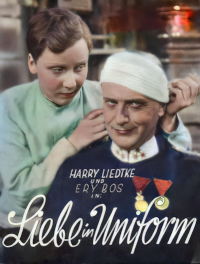
Original Title: Liebe in Uniform. Comedy of errors 1932; 89 min.; Director: Georg Jacoby; Cast: Harry Liedtke, Ery Bos, Hans Junkermann, Julia Serda, Tibor Halmay, Loni Heuser, Paul Heidemann, Fritz Kampers; Reichsliga-Tobis-Klangfilm.
A chocolate factory owner tries to save the struggling enterprise by arranging a union between his son and a wealthy woman. However, the young woman realizes the son isn’t her ideal partner and is captivated by a chauvinistic captain. Through misunderstandings and thrilling escapades, she changes the captain’s perspective, saves the factory, and leaves behind a betrothed son and his true love.
Summary
The Ko-Scho chocolate factories are celebrating their 100th anniversary. Theodor Kobler, the owner of Ko-Scho, has extended an invitation to Lia Roland, the only daughter of his competitor Roland, who owns the Ro-Scho chocolate works. The purpose of this invitation is to safeguard himself from the looming threat of bankruptcy by arranging a union between his son Gustav and the wealthy Lia Roland.
Lia arrives at the celebration, warmly welcomed, accompanied by her friends on a plane. However, she quickly realizes that Gustav Kobler is not the suitable husband for her, particularly because he is already secretly married to Milli, with whom he is deeply in love. On the other hand, among the attendees, Lia finds herself intrigued by a certain gentleman. This man is Rittmeister von Wedell, who has come with his dragoon officers to extend their congratulations to her.
Lia learns from Lieutenant von Fink that Captain von Wedell is a self-professed misogynist, which leaves her feeling unsettled. Nevertheless, Captain von Wedell pays her no attention. In fact, when she playfully sings a cheerful celebratory song while wearing Gustav Kobler’s tailcoat, the captain abruptly leaves the gathering with his companions. This behavior only increases Lia’s irritation.
Through Lieutenant von Fink, Lia discovers that Captain von Wedell is actually celebrating his beloved horse Amanda’s birthday at home with the officers. Compelled by her curiosity, Lia persuades Fink to take her to this birthday party, where she pretends to be Gustav Kobler by wearing his tailcoat. To her delight, Lia realizes that Amanda is the captain’s favorite horse.
Assuming the persona of a young gentleman, Lia indulges in alcohol and, much to Lieutenant Fink’s dismay, ends up spending the night in the captain’s apartment. During this time, Captain von Wedell, who had harbored suspicions about the entire situation from the beginning, uncovers Lia’s true identity as a young woman. He instructs his servant Nepomuk to dismiss the young Kobler in an impolite manner the next morning, before leaving for the barracks himself.
Meanwhile, Corporal Hoppe is searching for Gustav Kobler, as he was supposed to have enlisted the previous evening as a one-year volunteer. Nepomuk relays to Hoppe that Gustav Kobler is in the Rittmeister’s apartment. As a result, Lia, mistakenly believed to be the one-year volunteer, is taken to the barracks, where she embarks on a series of thrilling adventures under the watchful eye of the strict guardmaster Gebauer.
-s.’ review in Film Kurier No. 253 (October 26, 1932)
The Liedtke fan community is overjoyed to witness the return of their beloved star. Liedtke has successfully recaptured his old charm, thanks to the sound film which has revitalized his performance. Playing the role of a woman-hating captain, he displays remarkable restraint while taking love seriously, albeit only until the happy ending.
Ery Bos skillfully executes the role of taming the shrew, impressing the audience with her delightful presence. She infuses the timeless trouser role with vitality and charm, giving it a fresh appeal on the screen. Never resorting to cuteness or coquettishness, she possesses the perfect finesse and flair for the character. With agility and amusing impudence, she hilariously portrays a slight intoxication. Her inclusion in the film adds a significant comedic talent to the ensemble.
Credit for this accomplishment goes to Georg Jacoby’s astute direction, as he effectively highlights the cast in this narrative about rival chocolate factory families. In this tale, Julia doesn’t find her destined Romeo but instead flirts with the military, a choice that Jacoby deftly brings to life.
Richard Keßler, the reconciled author without any interim injunction, cleverly infuses military humor into the chocolate-themed story. This blend strikes a chord with the audience, who eagerly seek love and uniform-themed entertainment. Keßler’s plan succeeds, evoking plenty of laughter and applause, which is ultimately the primary objective.
The immensely popular duo of Hans Junkermann and Julie Serda elicit abundant laughter and amused chuckling from their devoted followers. Representing the lighter side of the military are Paul Heidemann, Ino Wimmer, Julius Eckhoff, and Fritz Kampers, who skillfully portrays a funny and hearty sergeant without resorting to exaggeration. Additionally, Karl Ettlinger, Paul Biensfeldt, Eugen Rex, and Dammann shine in their civilian roles.
Loni Heuser proves to be a wonderful and amiable partner in Tibor von Halmay’s enjoyable contortionist comedy. Käte Lenz delivers a spirited performance as a character plagued by stage fright.
The film’s music, composed by Franz Doelle, with set designs by Heinrich Richter and cinematography by Willy Hameister, is a noteworthy element. Doelle’s compositions provide light and lovely melodies, occasionally infused with parodic touches, which are skillfully performed by Egon Kaiser’s well-led orchestra. The lyrics, penned by Willy Rosen and Kurt Schwabach, further enhance the musical experience.
The packed Titania-Palast reverberates with enthusiastic applause, celebrating the film’s success.